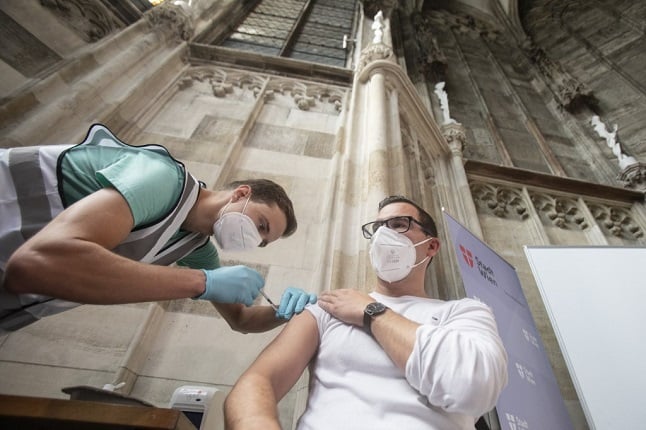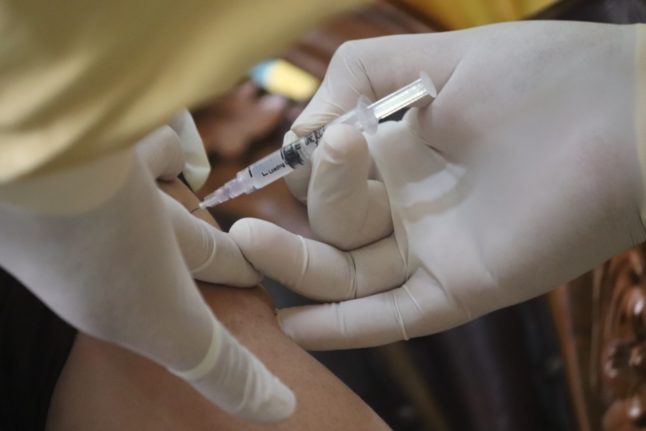What does the law propose?
It would require people living in Austria to get a full course of vaccinations against Covid-19, meaning that those who didn’t would face fines.
In its first draft, the proposal stated that people who have not received a vaccination would be contacted by letter every three months with a reminder to get the jab, and would be subject to fines, also once every three months at €600, if they do not get a vaccine.
These fines would rise to €3,600 if the person refused to pay the initial fine. People’s personal financial situation would be taken into account when setting the fine.
The law would apply to people aged 14 and older, and the same exemptions that currently apply to the 2G rule would also apply to the mandate, including pregnant women and people for whom vaccination is not medically advised.
What has the response been so far?
During its review period which ended on Monday, the draft of Austria’s vaccine mandate law had received 108,325 statements of opinion, a record.
Relevant organisations are invited to submit their opinions on draft laws including those who will be involved in their implementation, and private individuals can also respond.
The digital health organisation Elga for example said in their response that it would not be possible to put in place the technical infrastructure needed for the checks before April. This means that it is unlikely fines would be issued before then, although authorities may carry out random checks.
The Chamber of Commerce was one of a few organisations in favour of postponing the mandate, while several regions said they would need funds to provide the staff needed to cope with the expected tens of thousands of appeals.
The majority of responses came from private individuals, many submitting the same text.
What impact would the law have?
The goal of the law isn’t to fine or punish people, but rather to encourage them to get the vaccine.
When the plan to make the jabs mandatory was first announced in November, just over 65 percent of the total Austrian population was fully vaccinated. Now, that figure has risen to 71.4 percent — although the rise is also because of the vaccine being rolled out to younger age groups in recent months.
In its own estimates, the government predicts that there would be 1.4 million proceedings in district authorities and 100,000 in state administrative courts as a result of the law.
This means that the regions expect they will need to hire dozens of extra staff members to deal with the increased workload: 150 to 200 new roles are expected in Styria and 150 in Upper Austria, for example. It’s worth remembering that these same authorities already have a heavy workload due to Covid and their contact tracing obligations for example.
When can we expect the mandate to come into effect?
Chancellor Karl Nehammer has said that the plan is still for the law to come into force from February 1st, saying it only required some “fine-tuning”.
That’s despite digital health organisation Elga saying that setting up the technical infrastructure for the mandate would be tough to achieve by the February 1st deadline — they said April was a more realistic goal.
In the most recent draft, March 15th is no longer the deadline for the vaccine, and instead the Health Ministry is responsible for setting a new date.
For how long will it apply?
The mandate isn’t intended to be a permanent measure, and should only last as long as the pandemic situation requires.
The current draft sets an expiry date of January 2024.
WHO’s Emergencies Programme Executive Director Mike Ryan said that vaccine mandates should be “clear, unambiguous and time-limited” and used only as a last resort if other efforts to increase the vaccination rate have not achieved the needed results.
Is it really legal?
Yes, compulsory vaccination is legal if it can be shown to be “proportional” — in other words if it would reduce the impact of the pandemic enough to make such an infringement justifiable.
Despite that, the government for a long time said it would not make vaccines compulsory for the general population (vaccination against several diseases including Covid-19 is already compulsory in some professions). When announcing the change, Health Minister Wolfgang Mückstein said it was being introduced as a “last resort”.
Opponents of the law argue that it is simply too great an overstep into residents’ private lives and free choice, and weekly protests against Austria’s stringent Covid measures intensified after the law was announced.
What are the next steps?
Discussions on the law will be carried out over the weekend between the government, opposition parties and experts.
A draft will be debated in the parliamentary health committee next week starting on Monday, but the final version of that draft is likely to be produced over this weekend. That means there may be some changes from the details we’ve already heard about.
The law needs to be passed in parliament by a majority of 50 percent. If it does, the law would come into effect from February 1st if the current timeline is kept to, something Chancellor Karl Nehammer has said will be the case.
It’s difficult to say if the bill has a 50 percent majority since the discussions are still in progress.
Of the three opposition parties, the far-right Freedom Party (FPÖ) is against a mandate; the Neos are divided with the party’s pandemic spokesperson saying he will vote against it, and the centre-left SPÖ has not confirmed any party line, with some senior figures having asked for the bill to be postponed or to include greater focus on incentives for vaccination.



 Please whitelist us to continue reading.
Please whitelist us to continue reading.
“When the plan to make the jabs mandatory was first announced in November, just over 65 percent of the total Austrian population was fully vaccinated. Now, that figure has risen to 71.4 percent — although the rise is also because of the vaccine being rolled out to younger age groups in recent months.”
I might be wrong but isn’t the roll-out to younger age groups a reason for the SLOW rise rather than the rise in the vaccination rate? When you include a new younger age group more or less zero percent of those people are vaccinated so the TOTAL population of vaccinated people falls.
“When the plan to make the jabs mandatory was first announced in November, just over 65 percent of the total Austrian population was fully vaccinated. Now, that figure has risen to 71.4 percent — although the rise is also because of the vaccine being rolled out to younger age groups in recent months.”
I might be wrong but isn’t the roll-out to younger age groups a reason for the SLOW rise rather than the rise in the vaccination rate? When you include a new younger age group more or less zero percent of those people are vaccinated so the TOTAL vaccination rate falls.
Can I delete my first comment? I tried to edit it and ended up publishing two comments. (Also this one can be deleted!)